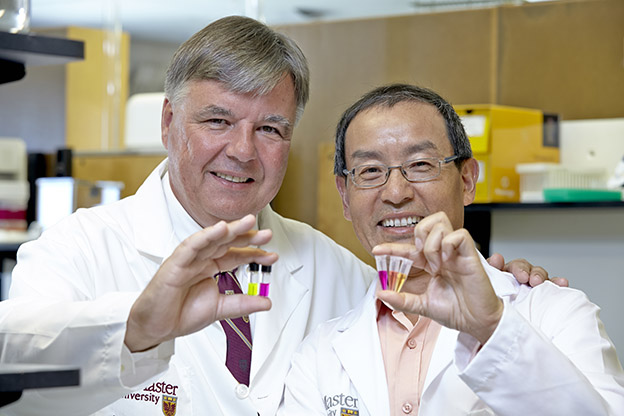Glow of poop may shed light on diagnosing cancer

Gastroenterologist Bruno Salena and biochemist Yingfu Li are developing fluorescent DNAzymes that will detect cancer markers in stool samples. If cancer is present, the molecules will glow, leading to early treatment and better outcomes for patients.
Two McMaster researchers are looking to diagnose colorectal cancer with glowing fecal matter.
For what could become an inexpensive, simple, accurate and non-invasive test, biochemist Yingfu Li and gastroenterologist Bruno Salena are developing fluorescent DNAzymes that will detect cancer markers in stool samples. If cancer is present, the molecules will glow, leading to early treatment and better outcomes for patients.
The two hatched the idea on the golf course. Li and Salena work in different scientific fields, but discovered they share an interest in early detection of disease. Li has been studying fluorescent DNAzymes for many years, while Salena has been treating patients with colorectal cancer and other bowel diseases.
“We got talking about the fluorescent enzymes and the possibilities for early detection of cancer and I got quite excited,” said Salena, an associate professor of medicine of the Michael G. DeGroote School of Medicine. “I looked at Dr. Li’s data and I loved it. I thought this is something new we can try.”
The pair were awarded a Canadian Cancer Society (CCS) Innovation Grant in July.
“The Innovation Grants program is perfect for this type of research,” said Li, a professor in the departments of chemistry and biochemistry and biomedical sciences. “There are no other grant programs in Canada that support unconventional approaches like this.”
The researchers will first create a DNA pool that contains as many as a quadrillion (1015) different DNA sequences. With this massive DNA pool they will conduct a Darwinian-like evolution experiment in a test tube. The purpose of this experiment is to search for a few “magical” DNAzymes that will light up in the presence of stool samples from people who have already been diagnosed with colorectal cancer, but will remain muted in samples from healthy participants.
If the researchers are successful, the detection tool could one day be used in the doctor’s office as a simple, inexpensive test for colorectal and other cancers.
“This serendipitous collaboration between Drs Li and Salena allows them to tackle an old problem in a completely new way,” said Dr. Siân Bevan, research director for the Canadian Cancer Society. “It’s a great example of the importance of supporting innovation in cancer research.”
The McMaster grant was one of 51 CCS grants worth a total of $10 million.

